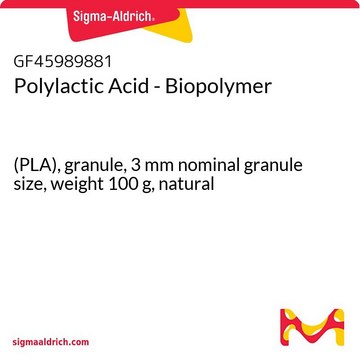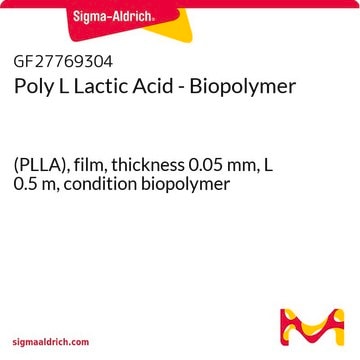38534
Polymilchsäure
Mw ~60,000
Synonym(e):
Poly-(2-hydroxy-propionsäure)
Anmeldenzur Ansicht organisationsspezifischer und vertraglich vereinbarter Preise
Alle Fotos(1)
About This Item
Empfohlene Produkte
Form
solid
Qualitätsniveau
Haltbarkeit
limited shelf life, expiry date on the label
Mol-Gew.
Mn ~30,000
Mw ~60,000
InChI
1S/C3H6O3/c1-2(4)3(5)6/h2,4H,1H3,(H,5,6)
InChIKey
JVTAAEKCZFNVCJ-UHFFFAOYSA-N
Suchen Sie nach ähnlichen Produkten? Aufrufen Leitfaden zum Produktvergleich
Allgemeine Beschreibung
Polylactic acid(PLA) is a biodegradable polyester synthesized from lactic acid monomer via ring opening polymerization. Owing to its excellent thermal, mechanical and barrier properties, it is widely used in the field of tissue engineering, drug delivery, and orthopedic devices.
Anwendung
Polylactic acid can be used to prepare tubular scaffolds via the electrospinning method. These scaffolds are applicable in vascular tissue engineering.
It can be used to prepare PLA/polyvinyl alcohol wound dressing membrane through electrospinning and coating method. The coating of PLA improves the mechanical strength of nanofiber and acts as a protective layer to control the release of drug to the wound site.
It can also be used to synthesize free-standing, flexible ultra-thin PLA nanofilms which can act as a matrix for adhesion, spreading, and proliferation of skeletal muscle cells.
It can be used to prepare PLA/polyvinyl alcohol wound dressing membrane through electrospinning and coating method. The coating of PLA improves the mechanical strength of nanofiber and acts as a protective layer to control the release of drug to the wound site.
It can also be used to synthesize free-standing, flexible ultra-thin PLA nanofilms which can act as a matrix for adhesion, spreading, and proliferation of skeletal muscle cells.
Leistungsmerkmale und Vorteile
- Biocompatibility
- Lower toxicity
- Low cost
- Better encapsulation
Ähnliches Produkt
Produkt-Nr.
Beschreibung
Preisangaben
Lagerklassenschlüssel
11 - Combustible Solids
WGK
WGK 3
Flammpunkt (°F)
Not applicable
Flammpunkt (°C)
Not applicable
Persönliche Schutzausrüstung
Eyeshields, Gloves, type N95 (US)
Hier finden Sie alle aktuellen Versionen:
Besitzen Sie dieses Produkt bereits?
In der Dokumentenbibliothek finden Sie die Dokumentation zu den Produkten, die Sie kürzlich erworben haben.
Kunden haben sich ebenfalls angesehen
Tong Chen et al.
Carbohydrate polymers, 92(2), 1124-1132 (2013-02-13)
Core-shell structured multifunctional nanocarriers (NCs) of ZnO quantum dots-conjugated gold nanoparticles (Au NPs) as core and amphiphilic hyperbranched block copolymer as shell were synthesized for targeted anticancer drug delivery. The amphiphilic hyperbranched block copolymer contained poly(l-lactide) (PLA) inner arm and
L Pearce McCarty et al.
The Journal of bone and joint surgery. American volume, 95(6), 507-511 (2013-02-15)
A variety of complications associated with the use of poly-L-lactic acid (PLLA) implants, including anchor failure, osteolysis, glenohumeral synovitis, and chondrolysis, have been reported in patients in whom these implants were utilized for labral applications. We report on a large
Zhenxing Fan et al.
Environmental technology, 33(19-21), 2369-2374 (2013-02-12)
Biological nitrate removal using wheat straw and polylactic acid (PLA) as both carbon source and biofilm support was investigated. The results showed that biofilm could develop on the surface of wheat straw within 15 d, the denitrification rate was 0.067
Discussion: Autologous fat grafting and injectable dermal fillers for human immunodeficiency virus-associated facial lipodystrophy: a comparison of safety, efficacy, and long-term treatment outcomes.
David Teplica
Plastic and reconstructive surgery, 131(3), 507-509 (2013-03-01)
Huan Zhou et al.
Materials science & engineering. C, Materials for biological applications, 33(4), 2302-2310 (2013-03-19)
Fibrous bionanocomposites consisting of amorphous magnesium phosphate (AMP) nanospheres and polylactic acid (PLA) were fabricated by electrospinning. There are two important signatures of this paper. First, AMP, as an alternative to well-known calcium phosphate (CaP) materials, is added to PLA
Unser Team von Wissenschaftlern verfügt über Erfahrung in allen Forschungsbereichen einschließlich Life Science, Materialwissenschaften, chemischer Synthese, Chromatographie, Analytik und vielen mehr..
Setzen Sie sich mit dem technischen Dienst in Verbindung.










